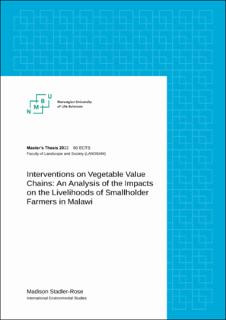| dc.description.abstract | Agriculture is a foundational component in Malawi’s society, contributing to income, food security, and livelihoods. With climatic stresses, unpredictable crop productions, and poor market access, vegetable value chains for smallholder farmers in Malawi are susceptible to increased risks for an already vulnerable population. An analysis of the pitfalls within the agricultural sector and value chains and determining the impacts on smallholder farmers is critical for identifying areas of improvement. This research analyses the vegetable value chains of smallholder farmers in Malawi. With support and guidance from the TRANSFORM programme, a micro-investment initiative to contribute to sustainable agricultural transformation, this study determines rural farmer’s main challenges and opportunities. Through cross-sectional, close-ended surveying in Mchinji and Mzimba districts in Malawi, with the help of Norwegian Church Aid (NCA) Malawi, data was collected from 300 smallholder micro-investment farmers. This study analyses contributing aspects along the vegetable value chain that create challenges for smallholder farmers to thrive. Including, the effects that gender inequalities have on agricultural and household decisions. The vegetable analysis proved that tomatoes are the most prevalent for production, grown by 42.6% of farmers’ and most profitable, earning 17,741 MWK per unit. While leafy green vegetables followed in quantity but varied in yield and revenue. The results from the collected data determined that market access varied based on gender, as women had a 16% higher average distance to the market than men, vegetable type, where cucumbers were sold at least 4 km further on average, and district, where Mzimba had more market access. However, intercropping is undoubtedly triumphant over monocropping, as average yield in units increased between 12%-58% for each vegetable. Enhanced farming methods and economic empowerment through income diversity are avenues to sustainable livelihoods. Therefore, interventions throughout vegetable value chains to strengthen smallholder farming in Malawi is an approach to improve food and nutrition and reduce poverty rates. | |
